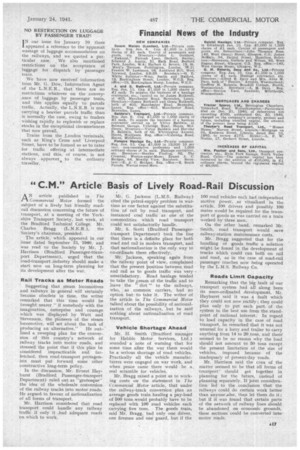"C.M." Article Basis of Lively Road-Rail Discussion
Page 19

If you've noticed an error in this article please click here to report it so we can fix it.
AN article published in The Commercial Motor formed the subject of a lively but friendly roadrail discussion concerning the future of transport, at a meeting of the Yorkshire Transport Society, last week, at the Bradford Technical College. Mr. Charles Bragg (L.N.E.R.), the Society's chairman, presided.
The article, which appeared in our issue dated September 13, 1940, and was read to the Society by Mr. J. Harrison (Bradford Passenger-transport Department), urged that the road-transport industry should make a start now on long-term planning for its development after the war.
Rail Tracks as Motor Roads
Suggesting that steam locomotives and railways in general will certainly become obsolete in time, the writer remarked that this time would be brought nearer " if somebody with the imagination, enterprise and courage which was displayed by Watt and Stevenson, the pioneers of the steam locomotive, will set about the task of
producing an alternative." He out-. lined a sweeping plan for the conver-. sion of this country's network of railway tracks into motor roads, and stressed the point that if this plan be considered impracticable and farfetched, then road-transport protagonists must put forward some other constructive lOng-term policy.
In the discussion, Mr. Ernest Hayhurst (Bradford Passenger-transport Department) ruled out as "grotesque the idea of the wholesale conversion of the railway tracks into motor roads. He argued in favour of nationalization of all forms of transport.
Mr. Harrison considered that road transport could handle any railway traffic if only it had adequate roads on,which to work.
Mr. G. Jackson (L.M.S. Railway) cited the petrol-supply problem in wartime as one factor against the substitution of rail by road transport, and instanced coal traffic as one of the commodities which road transport could not satisfactorily handle.
Mr. S. Scott (Bradford Passengertransport Department) took the line that there is a definite place for both road and rail in modern transport,. and that nationalizationis the only way to .co-ordinate them effectively.
Mr. Jackson, speaking again from the railway point of view, complained that the present flosition between road and rail as to goods traffic was very unsatisfactory. Road haulage tended to take the ;ream of the traffic and to leave the " dirt " to the railways, who, as common carriers, had no option but. to take it. The writer of the article in The Commercial Motor talked about the possibility of nationalization of the railways, but he said nothing about nationalization of road transport.
Vehicle Shortage Ahead Mr. H. Smith (Bradford manager for Hebble Motor Services, Ltd.) sounded a note of warning that for some time after the war there would be a serious shortage of road vehicles. Practically all the vehicle manufacturers were engaged on war work, and when peace came there would be a. real real scramble for vehicles.
Mr. Bragg raised a point as to working costs on the statement in The Coremercial Motor article, that under the railway-track conversion plan an average goods train hauling a pay-load of 500 tons -would probably have to be replaced with 100 road vehicles each carrying five tons. The goods train, said Mr. Bragg, had only one driver, one fireman and one guard, but if the
100 road vehicles each had, independent motive power, as visualized in the article, 100 drivers and possibly 100 mates would be required for the transport of goods as was carried on a train worked by -three men.
On the other hand, remarked Mr. Smith, road transport would save railway-station maintenance costs.
Mr. Bragg suggested that for the handling of goods traffic a solution might be found in the development of trucks which could run both on rail and road, as in the case of road-rail passenger coaches now being operated by the L.M.S. Railway Co.
Roads Limit Capacity Remarking that the big fault of our transport system had all along been its unco-ord,inated developmerit, Mr. Hayhurst said it was a fault which they could not now rectify; they could plan only to put each part of the system to the best use from the standpoint of national interest.. In regard to load capacity in the case of road transport, he remarked that it was not unusual for a lorry and trailer to carry anything from 14 to 20 tons, and there seemed to be no reason why the load should not amount to 50 tons except the present limitation of the size of vehicles, imposed because of the inadequaCy of present-day roads.
Mr. Harrison said the crux of the matter seemed to be that all forms of transportshould get together in planning for the future, instead of planning separately. If joint consideration led to the conclusion that the railways could do certain work better than anyone,else, then let them do it ; but if it was found that certain parts of the network of railway lines should be abandoned on economic grounds, these sectionscould be converted into motor roads.




















































